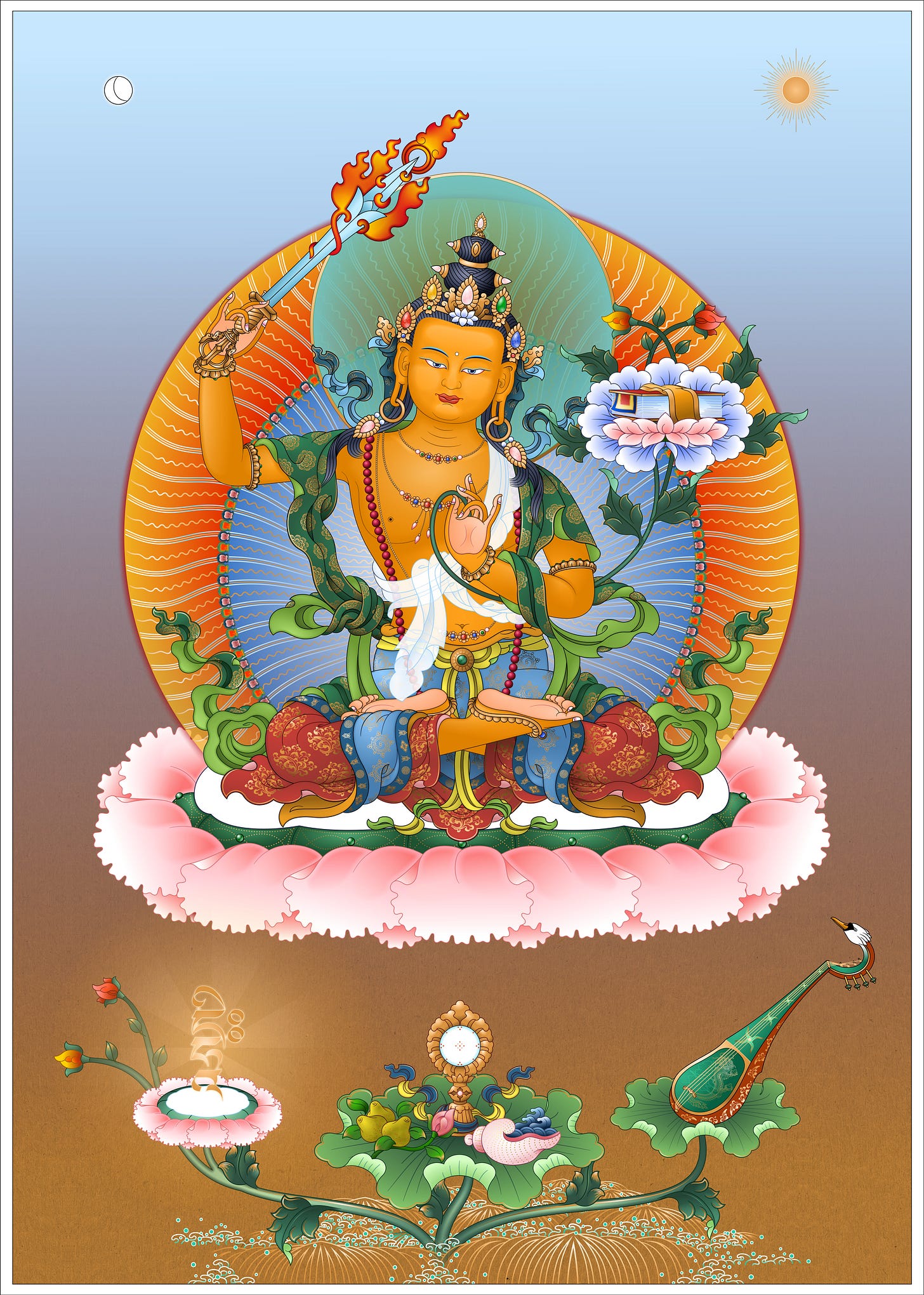In his poem “The Road Not Taken,” Robert Frost describes the experience of reaching a fork in the road while walking through the woods. Before him, the path splits in two separate directions. Standing at the crossroads, the poem’s narrator hems and haws, agonizing over the decision. Listen for the handwringing in the first stanza.
Two roads diverged in a yellow wood,
And sorry I could not travel to both
And be one traveler, long I stood
And looked down one as far as I could
To where it bent in the undergrowth;
Woven throughout Frost’s conversational prose is a palpable anxiety. Chafing against his finitude, the narrator expresses a wistful yearning to choose both options and the pain of knowing that he can only choose one. The poem is undoubtedly ambiguous - it's unclear whether Frost’s roads are literal or metaphorical - yet the famous final line that the narrator “took the road less traveled by, and that has made all the difference” is often interpreted as an affirmation of charting one’s own path. It’s invoked much like Joseph Campbell’s maxim “follow your bliss” to encourage folks to buck societal expectations and blaze their own trail. While such wisdom is valuable, further contemplation of the poem reveals reluctance, not resolution.
There’s no clear moral or aesthetic quality to either of the roads. In fact, other travelers seem to have “worn them really about the same.” Rather, the conclusion reached by the narrator is a reluctant acceptance simply that his choice bore consequences. He had to choose, and there’s no going back. His “sigh” could be one of contentment; it could also be one of regret.
This razor’s edge encountered at the crossroads, this burning blade stretched between regret and resolve is encountered astrologically in the second decan of Gemini. At this point in our Decan Walk, we have made it through an entire cycle of the seven Classical planets starting with Mars in the first decan of Aries. We return again to the red, dread face of the God of War, but first, let us consider the broader context of Gemini.
Gemini is the third and final sign of spring in the Northern Hemisphere,. The astrological year is initiated at the Vernal Equinox with the Sun’s Aries ingress. This violent upwelling of energy is eventually stabilized, maintained, and carried forward during the Sun’s subsequent transit of Taurus. Upon entering Gemini, this energy splits and separates, seeking to be spread. This movement is best understood in the growth of a plant. In Aries, a seed sprouts. In Taurus, it grows. And in Gemini, it flowers, longing to be pollinated and proliferated.
Symbolized by a pair of Twins, Gemini speaks strongly to opposites, exchange, division, and duality. Not quite one and not quite two, twins have long been considered auspicious. The ancient world abounds with stories of divine twins whose similarities are as striking as their differences: Castor and Pollux. Artemis and Apollo. Jacob and Esau. Freyr and Freya. Romulus and Remus. Having been born at the same time from the same womb, twins are an essential unity divided. The various comparisons and contrasts latent within these pairs illustrate the fractal nature of Gemini. For in Gemini, we encounter polarities and the infinite points between them.
This notion of plurality arising from an original unity is beautifully expressed in the famous formula of Chapter 42 of the Tao Te Ching:
“The Tao gives birth to the One.
The One gives birth to the Two.
The Two give birth to the Three.
The Three give birth to the ten thousand things.”
This verse presents a roadmap of Taoist cosmology. Out of the void spills an original unity. That unity then splits like twins into Yin and Yang - the archetypal duality that gives us the stark contrast of light and dark, positive, and negative, presence and absence. However, their intermingling gives birth to everything in this phenomenal universe. From unity comes duality comes diversity.
This proliferation of potential can be seen in Gemini 1, a Jupiter-ruled decan where the Greater Benefic causes possibilities to expand like a balloon. But this explosion of choice reaches a painful point when the energy enters Mars’ face. On one hand, we can see Mars’ inherent knack for division greatly accelerated in Gemini, creating an infinitude of experiences, identities, and ideas, interdependently linked, and interpenetrating one another.
However, Mars also delivers the acute knowledge that we are finite and unable to actualize all the dreams we entertain. Two roads or even twenty may lie before us in the forest, but we can only choose one. To choose one potential is to put to death all the others. One yes is also a thousand nos.
This anxious hand wringing over choice is illustrated in this decan’s corresponding Tarot card, the 9 of Swords. The image in the Rider-Waite-Smith deck shows a figure weeping and upright in bed, their face buried in their hands. Six cruel swords float above them while three seem to pierce the figure’s heart and head, suggestive of anxious thoughts plaguing the figure’s mind and cruelly keeping them from sleep. Commonly, the card indicates states of mental anguish: fear, worry, anxiety, indecision, insomnia, and regret. Here we encounter Mars in a Mercurial sign as inflammation of the mind. Haunted by ghosts of the past, the figure is taunted by what-ifs and what could have been. Alternately, if the figure looks to the future, they are tormented by an array of possibilities and the inability to know how each could play out.
Although initially vexing, this decan holds a virtue. Paradoxically, Mars in Gemini presents both the problem, namely choice, and its solution. Above all, Mars delights in severing. This act of splitting can be applied intellectually to cut through overthinking. Arguably, a certain degree of analytical logic belongs to Mars, not Mercury, as it involves the clear discrimination of concepts and ideas. When someone demonstrates a powerful, analytical intellect, we commonly say they have a “sharp mind.” It is for this reason that the mind is symbolized by a sword in Tarot. While it can bring all manner of injuries when wielded improperly, the mind should ideally be as sharp as a blade, able to cleave through false concepts, separating what is true from what is false, and eviscerating ignorance.
One embodiment of this marriage of Mars and Mercury is the Bodhisattva Manjushri. He is commonly depicted wielding a flaming sword. Frequently invoked by scholarly monks, orators, and students, Manjushri is a Bodhisattva of wisdom, appearing in many Buddhist texts to logically expound the truth of the Dharma to anyone who will listen. While his left hand is typically depicted holding treasured Buddhist texts floating atop a lotus, his right-hand holds aloft a flaming sword. This sword is symbolic of the awakened mind which can cut through all ignorance and duality. When honed to a razor’s edge, the wise mind can cut through the bonds of suffering, freeing ourselves and others from its clutches.
Let’s return now to our friend Robert Frost, who paused at the crossroads in the forest. When approaching such an intersection, we encounter the acute sting of finitude, knowing all our boundless potentials must collapse into a single actuality. What path will you choose? Once we clear through the thicket of thoughts with our mental machete and make our choice, then how do we live with it? How do we make peace with the ghosts created by each decision?
One way is to invoke Gemini’s multiplicity in the form of the multiverse. Imagine a new reality is created for each choice that appears along your path. Much like a Choose Your Own Adventure novel, the universe begotten by each choice exists side-by-side, like tunnels running through time in different directions. Sometimes it can be comforting to imagine all our alternate selves living out the possibilities that we denied ourselves. Somewhere out there exists another version of yourself who did go to graduate school, took the big trip or stayed in the relationship. Somewhere out there is an alternate version of yourself wistfully wondering what life could be like in your shoes. In each timeline, only one possibility was actualized. Like a domino falling, it led to its own string of events and choices. Be happy in the knowledge that you have this one life to lead. So, lead it well. Don’t lose sleep over dead dreams. Ride the razor’s edge from the present to the future.
About the Author
Caleb J. McCoy (he/him) is a teacher, consulting astrologer, and writer currently residing in misty Cascadia. His platform Heavy Metal Astrology unites his passions for heavy music and the malefic planets. Drawing upon philosophical studies, Buddhist practice, and astrological traditions old and new, Caleb seeks to recognize the essential necessity of Mars and Saturn without defanging them in the process. He desires folks to walk away from his writings and readings feeling empowered to bear any burden and rise to any challenge.
Instagram / Threads: heavymetalastro
Substack: Heavy Metal Astrology
References
Frost, Robert. “The Road Not Taken by Robert Frost.” Poetry Foundation, Poetry Foundation, www.poetryfoundation.org/poems/44272/the-road-not-taken. Accessed 16 May 2024.
Lao Tzu; Kwok, Man-Ho; Palmer, Martin; Ramsay, Jay. “Chapter 42.” Tao Te Ching, Element Inc, Rockport, MA, 1993, p. 110.







I always attributed my "cutting" mind (for which I'm most valued at work) to Mercury sextile Pluto, but having Saturn in this martian decan makes a lot of sense. This episode is describing my life and pain of not being able to choose all of the paths.
Brilliant! Thank you !! :) <3